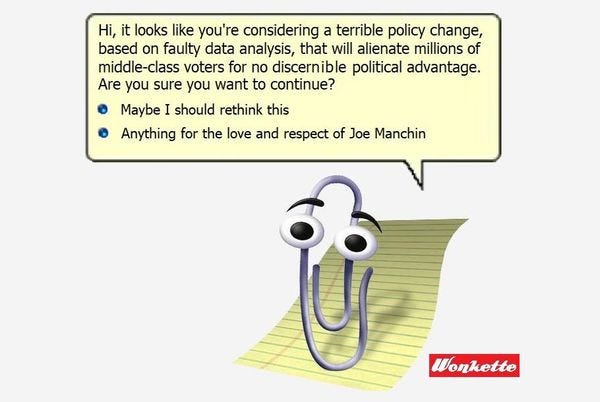Do Not Be The Guy Who Promised The Checks And Then Did Not Give The Checks, What Are You, New?
If that was just a trial balloon, let's pop that sucker.
The Senate voted early this morning to pass a budget bill that will eventually become Joe Biden's $1.9 trillion economic stimulus/COVID relief plan. The vote is one more step in the weird process of passing the plan through "budget reconciliation," which allows a bill to pass with a simple majority, avoiding a filibuster by Republicans. Now the real work of writing the details of the plan will go to House and Senate committees, to be passed hopefully by early March, before extended unemployment benefits from the last stimulus expire.
This week, President Joe Biden has said that he's open to making some changes to one part of the stimulus plan, the $1,400 individual payments to Americans. He said in talks with senior Democrats that while he won't budge on the dollar amount of the checks, he might be willing to more narrowly target who would get them, to satisfy calls from some that the checks should be targeted to help those "most in need," the Washington Post reports.
Where the previous rounds of individual payments have gone to individuals earning up to $75,000 (and couples making up to $150,000), Biden's reportedly considering a lower threshold, where the full $1,400 would go to those making $50,000 per individual or $100, 000 per couple. Above that income level, people would get reduced payments; the level at which the payments would vanish hasn't yet been set, although Press Secretary Jen Psaki said in Wednesday's press briefing that a hypothetical kindergarten teacher making $60,000 would still get a check.
All the reporting on this idea has noted that the narrowed eligibility proposal isn't set in stone and that the final shape of the stimulus could be different. Good. Biden has so far been willing to buck calls from Republicans and conservative Dems to be cautious in stimulus spending, and he ought to discard this idea, too. With the economy stalling out due to the pandemic, it's far better to be more generous in stimulating the economy than not to spend enough — a lesson that Biden learned after Barack Obama went small on stimulus after the 2008 crash and got a weaker recovery than if he'd gone big.
The arguments for "targeting" individual payments just aren't all that good. So let's not do that, OK?
As the American Prospect points out, there are some real problems with the central claim for restricting who gets a stimulus check. The idea is that we'd get the biggest boost from the stimmy if the checks go to folks who make the least, because they'll spend the money and buy things. Yes! But the study that's being used to support a narrower stimmy, by an outfit called Opportunity Insights, is short-sighted in its analysis of the January round of $600 payments, according to American Prospect's critique. That analysis
found that households with incomes under $46,000 saw their spending increase by 7.9 percent in the two weeks after receiving the checks, while those with incomes over $78,000 had spending increase only 0.2 percent. They estimate that those higher-income households would spent almost none of the $1,400 checks, and therefore that money should be better targeted.
The first problem is that, deeper in the data, the spending effect holds up for households up to $59,000. Yet any single households over $50,000 in the proposed targeting would get less money, despite the data showing that they need it enough to use it immediately, in the first couple weeks, after receiving it.
The far bigger problem, though, is the assumption that we should only be using stimulus payments to help out those who are in the most desperate straits, and that folks who are just above the level of financial ruin won't need help. (That ought to be a familiar head-shaker to people who make just enough to not get any insurance premium subsidies with Obamacare, too.) Maybe people with slightly higher incomes won't spend their stimmy checks immediately, but that doesn't mean they don't need the help or won't get that money into the economy:
Remember that the checks in the study came in at the beginning of the month. By the end of the month, those higher-income households might need that money to pay bills, or buy durable goods. Or maybe they drew down savings to cover for lost income during the pandemic, and now they're building it back up. Would that be a "waste," to allow people to accumulate emergency funds? Would it be a waste to allow families to pay down debt? The fact that these households don't spend the very moment they receive a check says nothing about whether or not it's good policy.
And since eligibility for the stimmy is likely to be based on 2019 adjusted gross income, there are far too many folks who were doing OK before the crash but whose incomes have been gutted since. Presumably, if they get their 2020 returns in right away, they'd meet the tightened requirements, but why even risk leaving hurting people out?
Beyond the economic argument there's the politics of it: Biden campaigned on another round of stimulus checks for virtually all Americans, and if millions of people who got the first two rounds of payments aren't included in the third round, they're likely to feel pissed off and cheated. As we noted the other day, the $1,400 payments are wildly popular in polling, even with Republicans, and when given the choice between "bipartisan bill" and "keeping the same eligibility as before," people went with more of the same, please by 53 percent to 21 percent.
So this unnecessary "compromise": It's for ... what? It certainly won't please Republicans, whose most moderate faction thought a stimulus proposal one third the size of Biden's was extravagant but just barely acceptable. Joe Manchin, the West Virginia Dem who has clucked the most about fiscal restraint, has already said he's on board with the $1.9 trillion top figure, although he added he'd like to see it address "targeted need." But we can't see him sinking the whole thing, either, not this big a priority, and not after his state's Republican governor said shut up and pass it.
As for the claim that we need to save money, we'll go with the American Prospect again:
Marc Goldwein of the Committee for a Responsible Federal Budget estimates that the more tightly targeted checks would cost $420 billion, as opposed to $465 billion. That's what we're fighting over? $45 billion in a $1.9 trillion package, to deny middle-class people (almost definitionally speaking; they make just over the median income) relief? That's the holdup?
Honestly, this really is one of those times when, in the larger context, $45 billion isn't that much money, not when the costs of inaction are so high. And certainly not worth the downside. If you're worried some people making $75K a year didn't really deserve it, then fine: Make the stimmy taxable above a certain level and get the revenue back that way. Then, some people will have received a loan they can pay back in taxes.
The stimulus is too important to nickel and dime. And the last thing Joe Biden needs to be doing right now is to feed the old "feckless Dems never get anything right" narrative. Go big! Look, Joe, you don't want to make me break out the My Little Pony gifs again to express my exasperation, do you?

[ Politico / New York / WaPo / American Prospect ]
Yr Wonkette is funded entirely by reader donations. If you can, please donate $5 to $10 a month to keep us stimulating your brain!
Do your Amazon shopping through this link, because reasons .




I didn't mean for that to sound frustrated at you (frustrated generally, a bit; at you, no), so you have my apologies for the error in tone there. And I was making (or agreeing with) your point. $50k isn't poverty, but as I've said elsewhere, it doesn't necessarily go all that far either.
I'll certainly agree that stones can be set - in a jewelry finding or in a line next to a sidewalk. I don't see how something could be "set in stone."